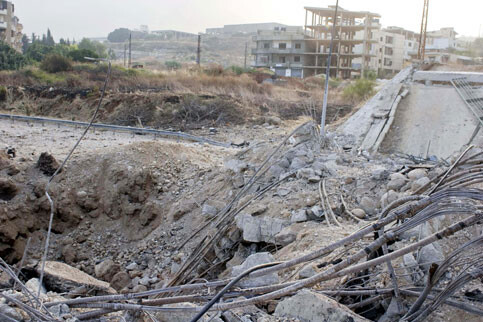Borj El Barajneh refugee camp 21 July 2006

The coast road from Beirut to Khalde bombed by an Israeli air strike 20 July 2006. The Israel air strikes have destroyed much of the Lebanese infrastructure and transport network. (MaanImages/Raoul Kramer)
First I would like to start with the situation here in Beirut. War has prevailed everywhere and the destruction has become our daily bread.
First and foremost, starting with Borj Al Barajneh camp: The camp is stuck in the middle of the fire and bombardment, isolated from the surrounding areas, leaving the residents suffering the tension of war and scarcity of life as since most of the Lebanese people were able to leave their place and houses to other parts of Beirut. The camp residents have nowhere to resort to except to stay in the camp.
Al Borj camp is located in the southern suburbs of Beirut, surrounded by Hezbolla area where the bombs strikes are very intensive, day and night. It has three main entrances from the airport road, one from Haret Horek and another one from the Borj area. So the bombing is all around it. Therefore, the best way to reach the camp is from the airport road, which has become very dangerous and targeted at anytime of the day and night with no previous warning which endangers our lives as well.
I am the director of the Women’s Humanitarian Organization in the camp. As the war started, people rushed to the supermarkets to supply with food but the supermarkets and shops were empty during the first hours. Immediately, the first idea that came up to my mind was how to aid my people in the camp and provide them with prompt assistance in response to the severe conditions the Palestinians were living before and during the war. Eighty percent of them are unemployed or have part-time jobs and sometimes seasonal jobs. They earn their livings on day by day basis. So the critical question is how they could manage through this hard situation.
On 15 July, I visited the camp, searching for answers to my question. I found out that people had decided to stay in the camp due to lack of any alternative and due to the shortage of money and housing. It would cost them a lot to leave the camp and find a place and hire a car. Furthermore, they don’t wish to relive the experience of being refugees for a second time. They told me - we are already refugees; do we need to be refugees again?
Today, 18 July 06, I went again to the camp and I can’t really describe that horrific trip. My car was the only moving vehicle. Every place was in deep silence and destruction. It’s only four km from my house to the camp - the first half of the way was manageable, but as we approached the camp it seemed to me from the first impression as if haunted by ghosts. No one can enter the area as it is extremely dangerous with the bombed airport on one side and the now totally destroyed Shia suburbs on the other. It was a scene of total devastation with all the buildings and roads totally smashed. I was shocked and overwhelmed. There was the smell of death and destruction everywhere.
The moment I entered the camp I felt I was on an island so isolated from the surroundings. I joined the other non-governmental organizations (NGOs) and arranged for an emergency meeting with them for a long-term plan to aid the camp. We didn’t know where to start from, the needs were so massive and beyond our expectations. It’s true that we have had a long experience during the past war but the situation now is different. For now we have no hierarchal structure in the camp. In the past, the PLO was in charge and provided people with all the assistance, but now the question is who could carry this burden along with us NGO? Even the NGOs are very tight with funds. All the shelters in the camp are not viable for protection at all. They have not been used since 1987. The women, children and elderly are terrified and trapped after days of sustained brutal bombing of the entire area around our camp. There is no electricity, no fuel for the generators, no medial supplies and we are in urgent need of food and medicine for the children and the elderly.
As a result of our meeting all NGOs and activists have agreed upon the following needs:
Our recent statistics show the following:
By the end of the meeting we divided ourselves and took upon our responsibilities and different tasks to clean the shelters and mobilize ourselves for emergencies. We hope to receive the support and funds on time to be able to provide our people with the urgent supplies and provisions needed. I left the camp praying to God to keep this road safe in order to come back again to our people with the aid and help.
We are facing a humanitarian crisis on an unprecedented scale and we call on the international community to stop Israel’s total destruction of Lebanon and the killing of innocent civilians. We are in urgent need of humanitarian assistance and we ask all good people in the world to help us.
Related Links
The Women’s Humanitarian Organization Director Olfat Mahmoud can be contacted at: 00961 3 019 775 (mobile), 00961 1 840 239 (telephone and fax)

